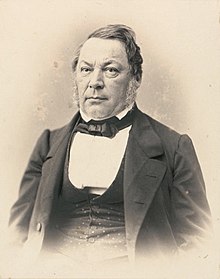Bluntschli
| Johann Kaspar Bluntschli | |
|---|---|

Johann Kaspar Bluntschli
|
|
| Born | 7 March 1808 Zurich |
| Died |
21 October 1881 (aged 73) Karlsruhe, Germany |
Johann Caspar (also Kaspar) Bluntschli (7 March 1808 – 21 October 1881) was a Swiss jurist and politician.
He was born in Zurich to a soap and candle manufacturer. From school he passed into the Politische Institut (a seminary of law and political science) in his native town, and proceeding thence to the universities of Berlin and Bonn, took the degree of doctor juris in the latter in 1829.
Returning to Zurich in 1830, he threw himself with ardour into the political strife which was at the time unsettling all the cantons of the Confederation, and in this year published Über die Verfassung der Stadt Zürich (On the Constitution of the City of Zurich). This was followed by Das Volk und der Souverän (1830), a work in which, while pleading for constitutional government, he showed his bitter repugnance of the growing Swiss radicalism. Elected in 1837 a member of the Great Council (German: Grosser Rath), he became the champion of the moderate conservative party.
Fascinated by the metaphysical views of the philosopher Friedrich Rohmer (1814-1856), a man who attracted little other attention, he endeavoured in Psychologische Studien der Staat und Kirche (1844) to apply them to political science generally, and in particular as a panacea for the constitutional troubles of Switzerland. Bluntschli, shortly before his death, remarked, “I have gained renown as a jurist, but my greatest desert is to have comprehended Rohmer.” This philosophical essay, however, coupled with his uncompromising attitude towards both radicalism and ultramontanism, brought him many enemies, and rendered his continuance in the council, of which he had been elected president, impossible. He resigned his seat, and on the overthrow of the Sonderbund in 1847, perceiving that all hope of power for his party was lost, took leave of Switzerland with the pamphlet Stimme eines Schweizers über die Bundesreform (1847), and settled at Munich, where he became professor of constitutional law in 1848.
...
Wikipedia
